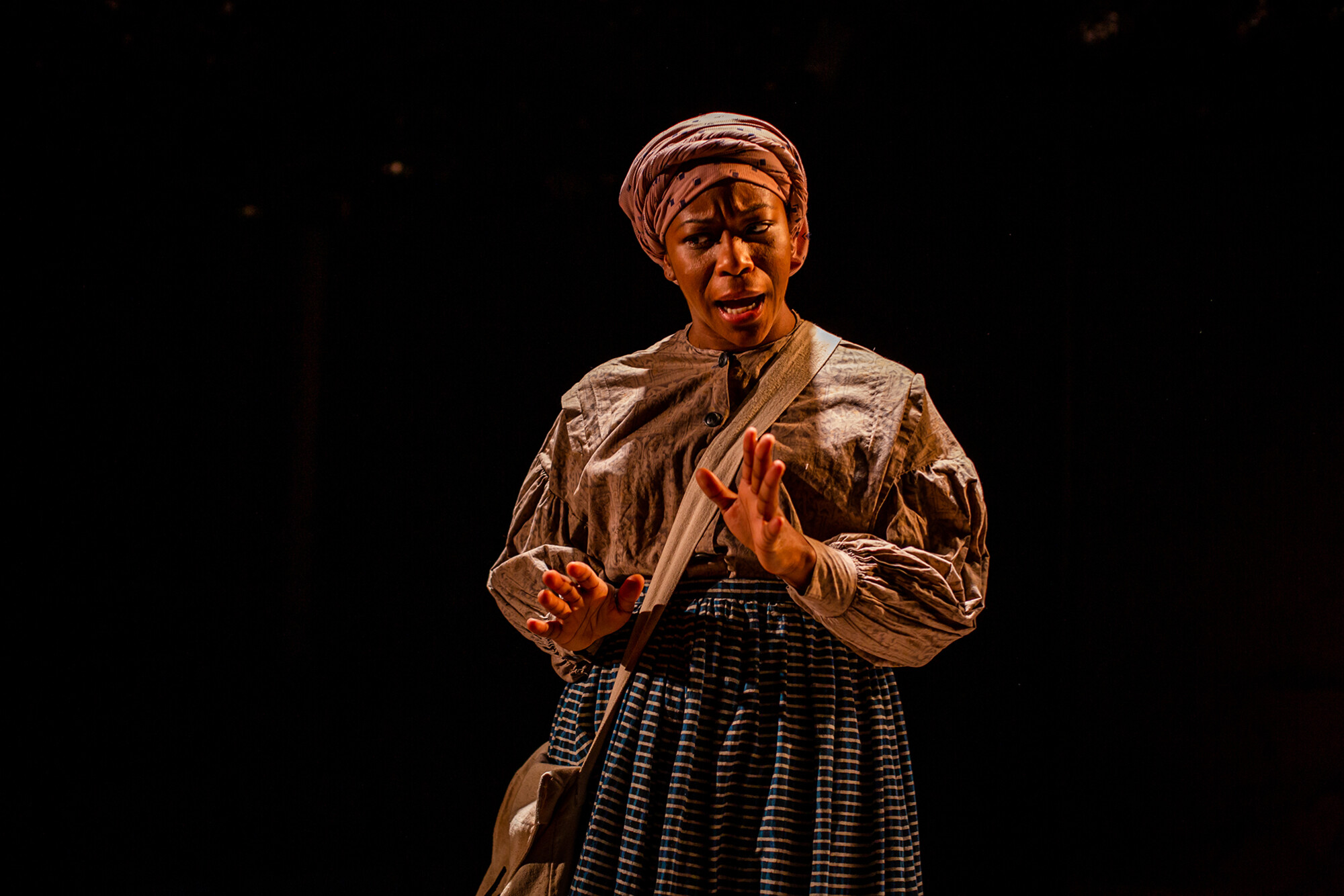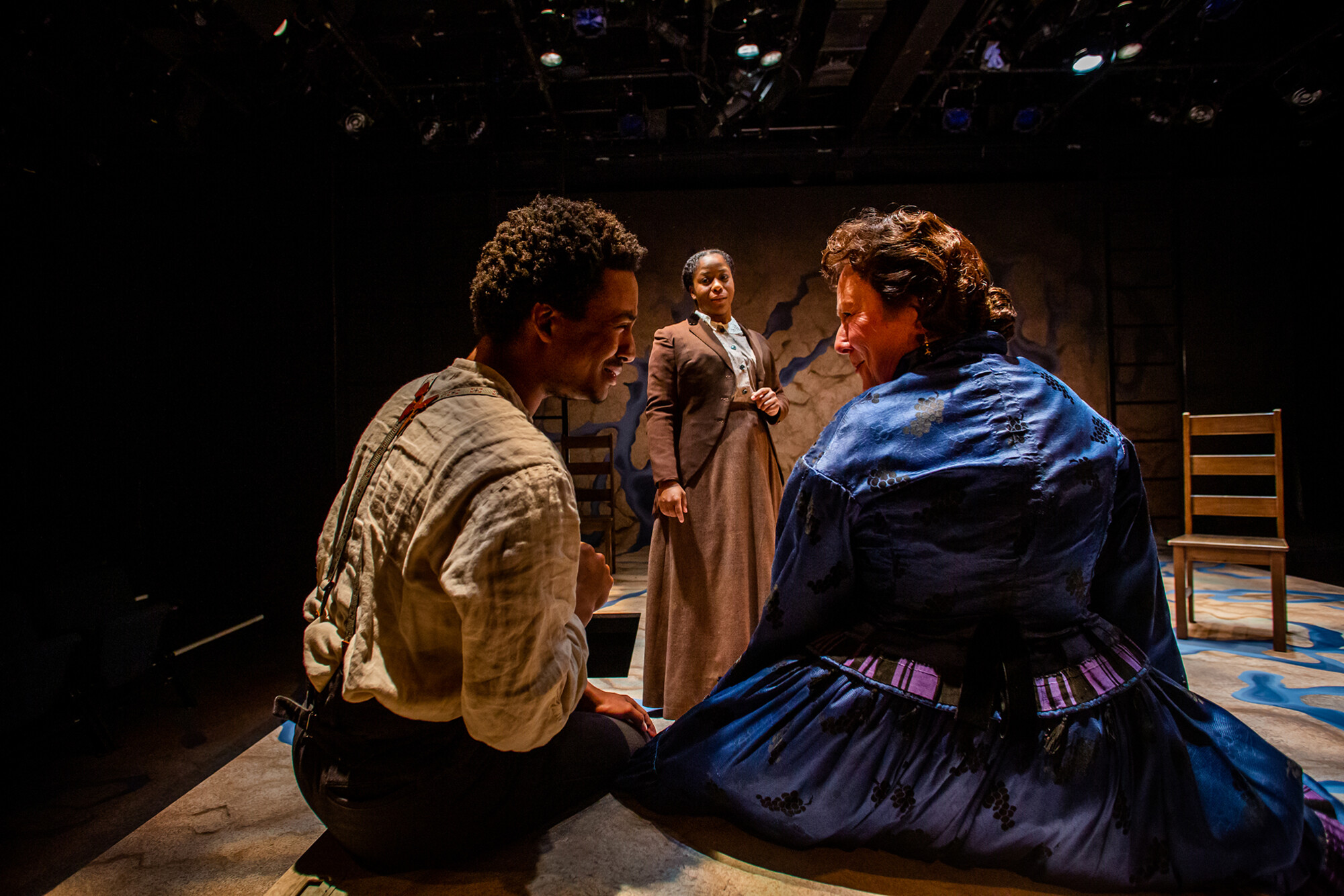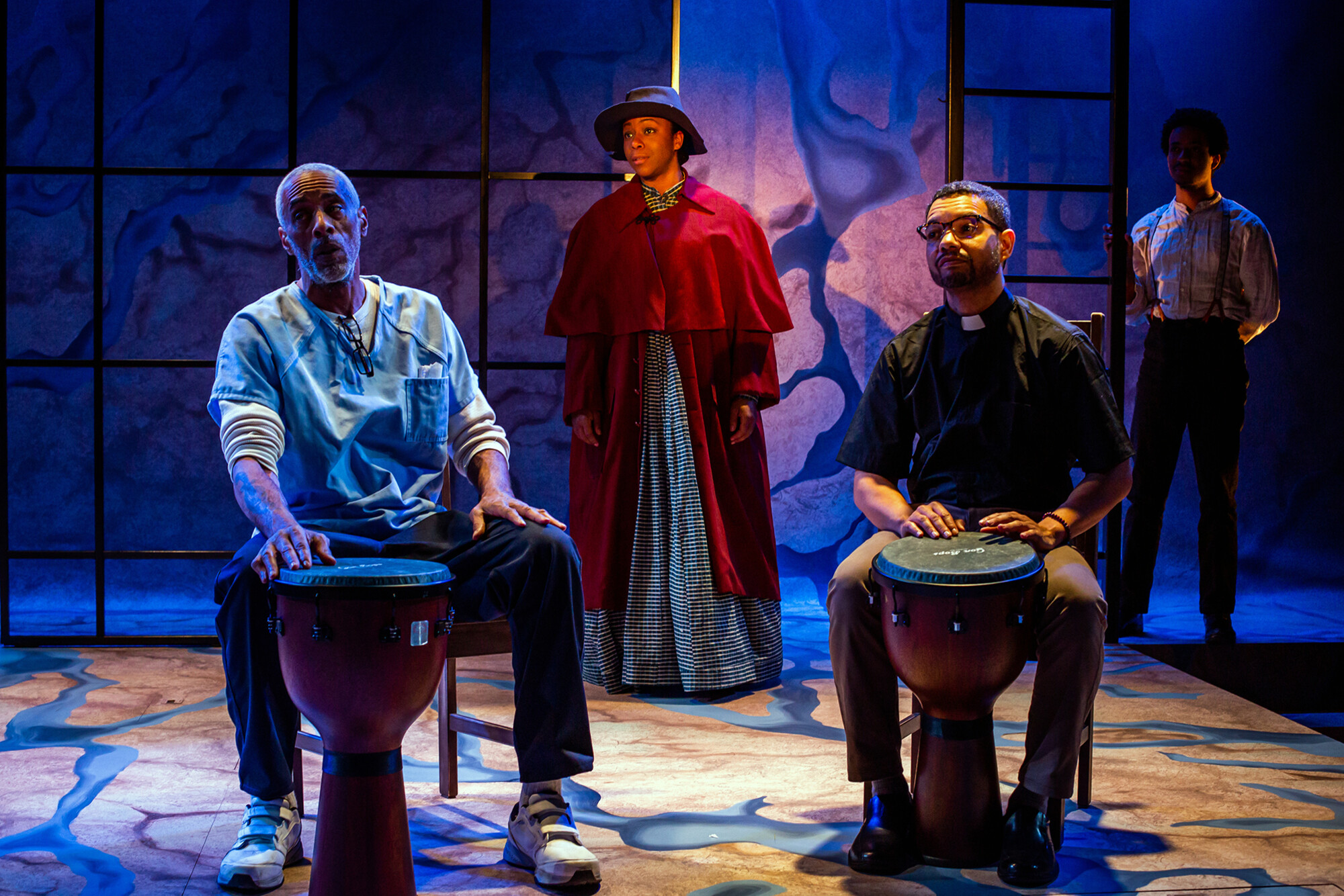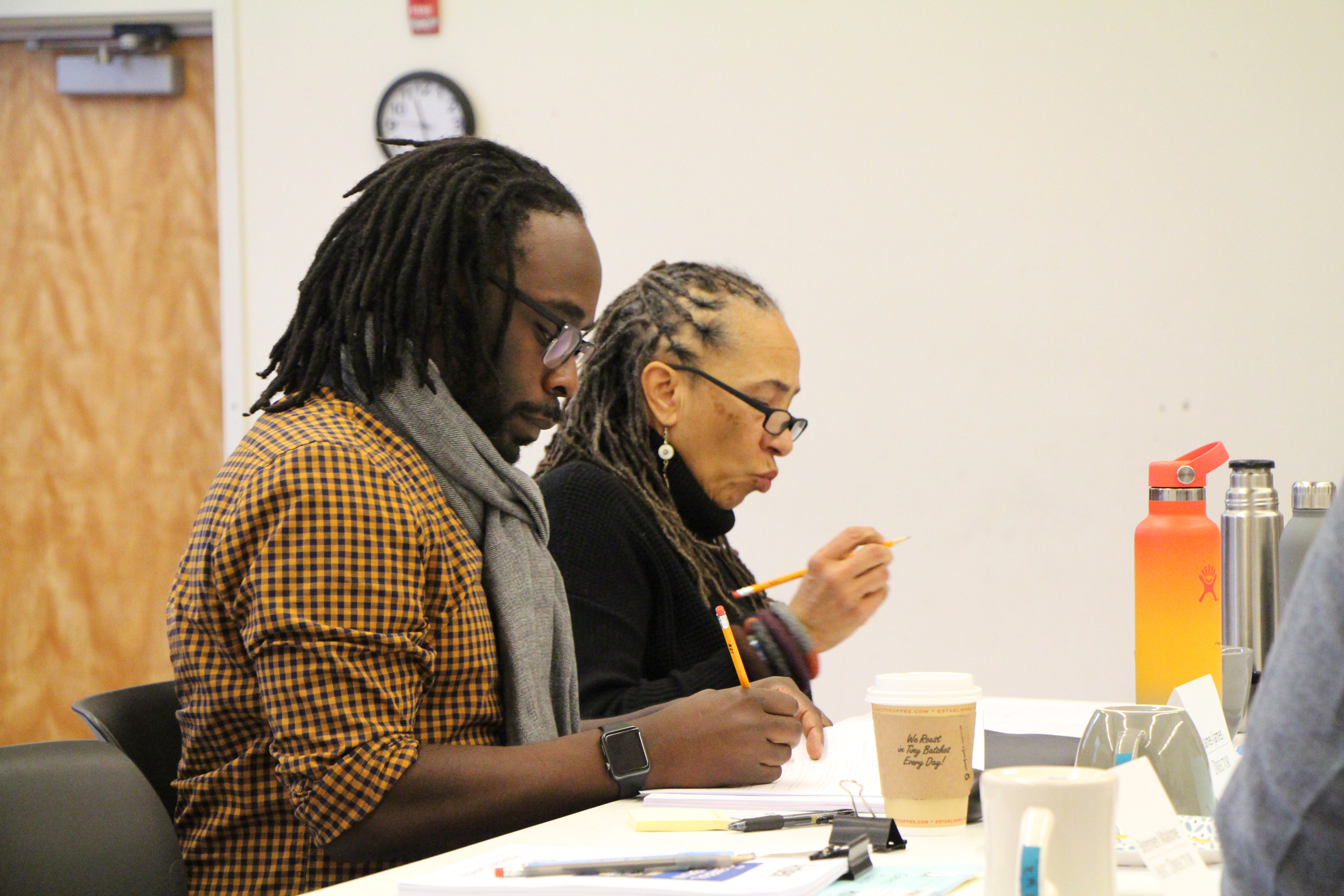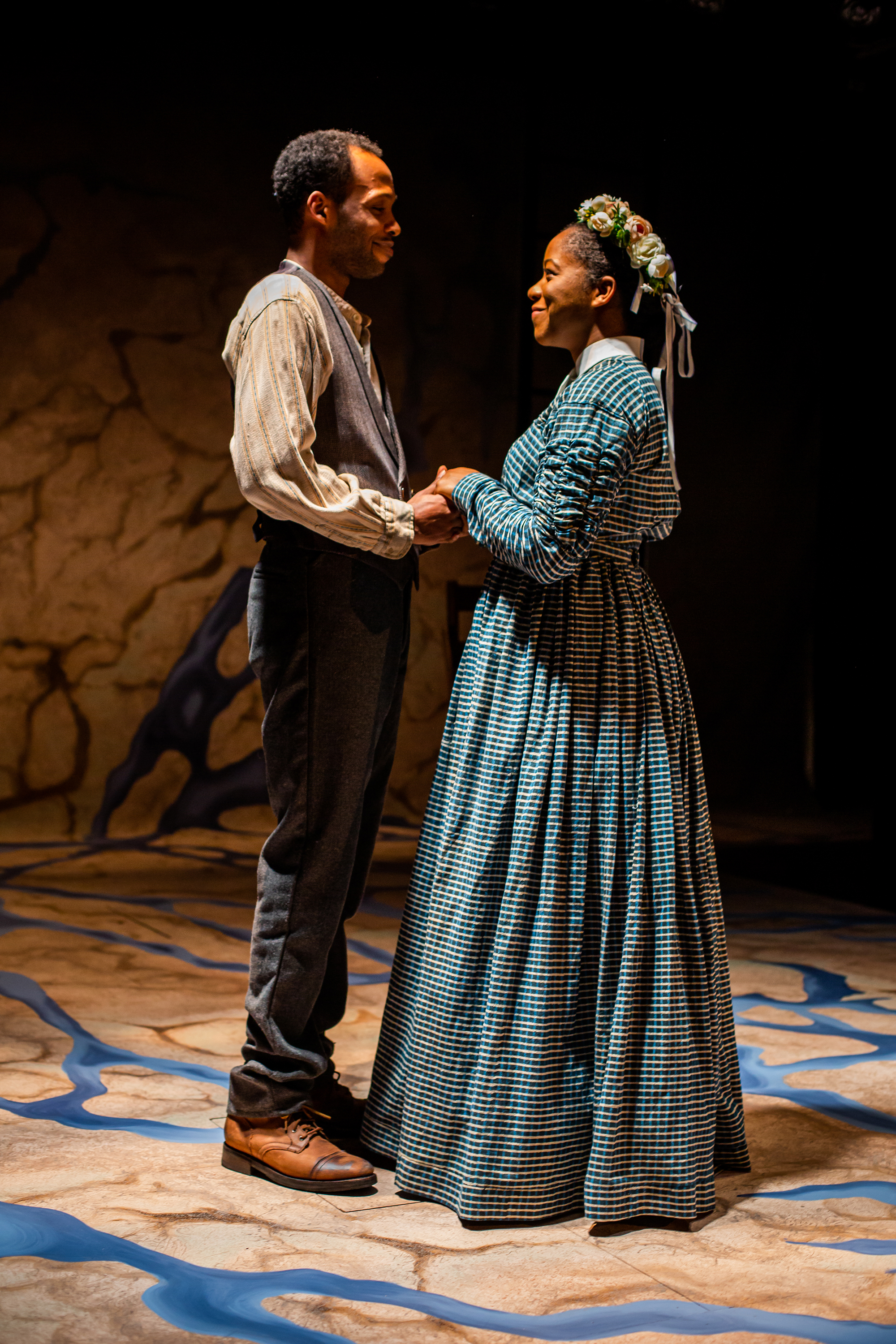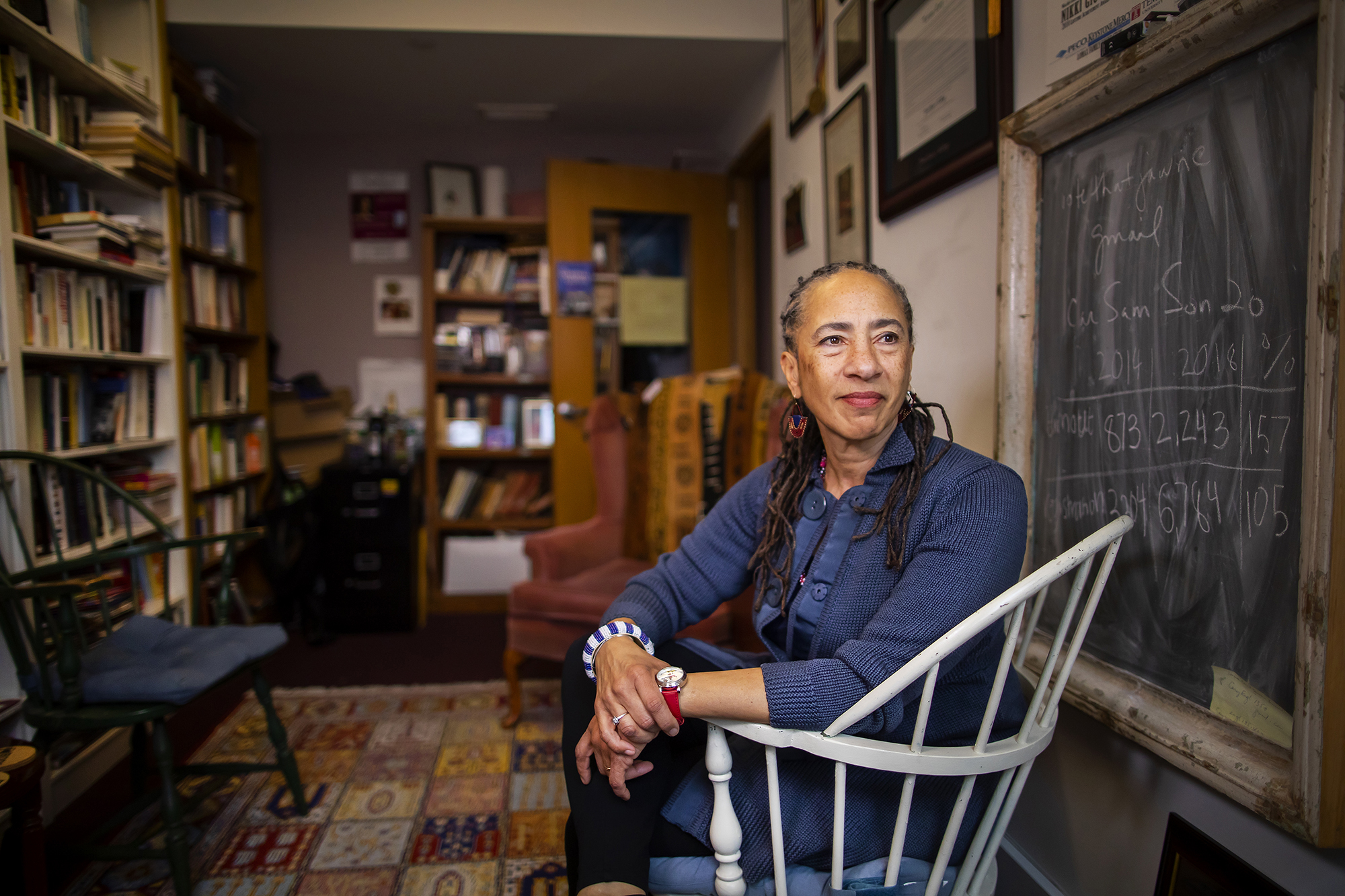
Standing in the center of The Arden Theatre stage, the play’s Chorus first speaks of Harriet Tubman by connecting her to the Chesapeake Bay:
Before she renamed herself, Harriet / Tubman, seven-year-old Araminta, / Barefoot in the cold Chesapeake Bay, sets / Free muskrats she’s told to drown in their traps. / And laughs! Because nothing is more joyous / Than freedom, cutting through the water, from then, to this stage.
“My General Tubman,” is the first play Penn faculty Lorene Cary has written, and the first new play that director, performer, and playwright James IJames has brought into production. Playing to sold-out audiences, “My General Tubman” has been extended twice since opening night in January and is now scheduled through March 15.
It was while Cary was with her family at the New Jersey seashore that she first started thinking of writing about Tubman, when she saw a photo of her displayed at Historic Cold Springs Village. The former slave, abolitionist, and activist had worked at the Cape May Hotel during the summers to earn the money she needed to go down south to bring enslaved people up north to freedom.
“So, this place that I loved with my family, Cape May, was suddenly full of Harriet,” Cary says. “I imagined her walking by the water, and I imagined that the dolphins—they come up really close on certain tides—how that felt for her, and all of her meditations on freedom.”
Cape May Point is Cary’s favorite place at the shore. “It’s just at the tip, so that you can stand there and see sunup and sundown. I think it’s a spiritual, amazing, powerful place; it’s critical to bird migration,” Cary says. “So it makes sense she’d be there.”
A map of the land and rivers and bays creates the backdrop for the staging of the two-hour play in which place and time shift like magic. Tubman connects with men in a modern-day Philadelphia prison, coming back and forth from her 19th-century life to recruit them for her army of freedom fighters in the Civil War.
Tubman was known to have “spells,” or seizures. It’s during those moments that Cary imagines her time traveling to today, called by the prisoners’ singing voices and rhythmic drums.
History and music are part of all of Cary’s other works of fiction, nonfiction, memoir, essay, opinion, and even an opera libretto.
“Lorene seems attuned to the most vital aspect of a situation, whether on the page or in lived experience,” says English Department Chair Paul Saint-Amour. “No matter how deeply buried it is, she knows how to find the main root. It’s a remarkable power to witness.”
Acclaim for “My General Tubman”
From West Philadelphia, Cary received both her bachelor’s and master’s degrees in English from Penn in 1978. Cary has been on Penn’s English faculty, teaching writing for 25 years.
The past year has been a remarkable one for Cary, with the spring release of her memoir, “Ladysitting: My Year with Nana at the End of Her Century” about caring for her 100-year-old grandmother. The book has received wide media attention and is coming out in paperback this summer.
Cary also debuted her first opera, which grew out of the memoir, the result of a residency with the American Lyrical Theater to write the libretto, paired with composer Liliya Ugay. “The Gospel According to Nana” was performed on Penn’s campus in the fall.
Originally, Cary had written Tubman into an opera. “The opera didn’t work. But I couldn’t let go of her,” Cary says. She approached Terry Nolan, producing artistic director at the Arden, which has a fund to support play development. “My General Tubman” is the 45th play commissioned in 30 years.
The play also has received attention from the press, including The Philadelphia Inquirer, and an hour-long program on Radio Times with Marty Moss-Coane on NPR that featured a conversation with Cary, IJames, and a live performance by actors Danielle Leneé, who plays Tubman, and Brandon Pierce, who plays her husband Nelson Davis.
“I'm grateful for it,” Cary says when asked about the press coverage and sold-out shows. “It’s a little surprising. I’m kind of shocked. I didn't know what to expect.”
Mashing together the past and present
Cary has been writing the play for four years, but rewriting while rehearsing was new to her, starting in mid-December and working with the director and performers 10 a.m. to 7 p.m. nearly every day. Cary says the actors would ask her to explain her thinking to inform their performance. “It was like a creative meat grinder,” she says.
Going through notes each night, getting up before dawn, she would create new versions daily with help from director Ijames and dramaturg Michele Volansky. “The theater professionals are the first audience, and they are working so hard to understand it and embody it,” she says. “So if it didn’t work for them, I needed to make it work.”
Being so collaborative is different from her other forms of writing, which remain private until published. “So it feels like something that’s gone through me; as if I’m a piece of glass, with light passing through. I’ve written the script, but not the performance,” she says. “I don’t feel the strict ownership, although the play on stage does feel very, very close and familiar.”
For the first time last summer she taught in the Penn Abroad English course in London, Writing for Children. Part of the experience included attending three live theater productions each week, which proved to be critical to the development of Cary’s play.
“It’s a glorious opportunity no matter what. But if you’re going to come back and rewrite your play, what could be a better tutorial?” she says. “It gave me great confidence because I saw all these attempts, all these trials, all these different approaches. I was in love with the skill, the acting, the lights, the staging.”
Because “My General Tubman” owed structural elements to “Henry V,” which Cary read and loved for years, she took in that play in London, too. Shakespeare’s Chorus guides the audience through shifts in time and place and urges them to imagine scenes impossible to stage. Cary says having her Tubman move between the past to the present is her own “psychic spiritual reality,” and how she wanted to tell the story. The Chorus helps the audience make those jumps.
“It’s like the past and the present mashing together,” she says. “It is like building a house where a gas station used to be, and then smelling the fumes. That’s what America’s past feels like.”
What makes Cary furious, she says, is when slavery’s vital role is not included in the story of American history, like in some plays she saw in London. “It made me understand why I felt so strongly that I wanted to tell her story in a theater,” she says. “We should acknowledge it. It should be a part of us.”
Bringing Tubman “back to Philadelphia”
Cary’s first short story, written in middle school, was about a woman escaping from slavery. Her novels include the best-seller Black Ice, a memoir about her experiences as one of the first female African American students in a New Hampshire boarding school, and The Price of a Child, chosen as the first One Book One Philadelphia selection. Cary has written scripts for videos at The President’s House exhibit on Independence Mall, which tell the stories of nine enslaved Africans in the household of President George Washington.
Through Art Sanctuary, a nonprofit she founded to support African American art and artists, she spent time in prisons, which she says informed her writing of “My General Tubman,” as did her time on the Philadelphia School Reform Commission. The play’s present is clearly in Philadelphia, with specific references to streets and neighborhoods and landmarks. “I wanted to bring her back to Philadelphia, because just as I was shocked to see her picture in Cape May, I was also shocked to find out how much time she spent here,” Cary says.
The future for “My General Tubman,” beyond the Arden run is not yet known. Perhaps it will be performed at other regional theaters, or Cary may also write a shorter adaptation for students to perform.
For now Cary is focusing on developing her nonfiction writing course for the fall semester, Writing and Politics, that includes a citywide initiative, #VoteThatJawn, to increase 18-year-old voters’ registration, started in conjunction with a 2018 Penn class. As part of her courses, she encourages her students to write for SafeKidsStories.com, an online publication she created that features writing by her students and others.
Although she has ideas for another opera and a possible young adult novel, for now she is going to “take a breather” on new projects. In what she calls the “no excuses writing tour” she has produced a memoir, an opera, and a play.
“In the play, Harriet says that she’s been through Maryland and Virginia and ‘comes up lame’ in Philadelphia. I’ve been trying to not come up lame, and just run through the tape,” she says. “And I look up, and here it is: the work accomplished and now being read and seen by people. That’s what you want. You hope that it is enough to fill up people’s hearts and minds.”
Lorene Cary is a senior lecturer in the Department of English in the School of Arts and Sciences.
Paul Saint-Amour is the Walter H. and Leonore C. Annenberg Professor in the Humanities and chair of the Department of English in the School of Arts and Sciences.
Homepage photo: Cary has been working on the play for four years while also writing a memoir and an opera libretto. All three works have been published or performed in the past year.




